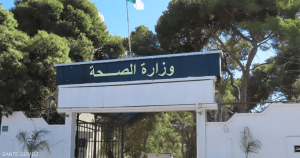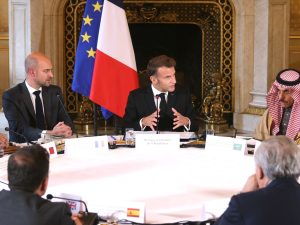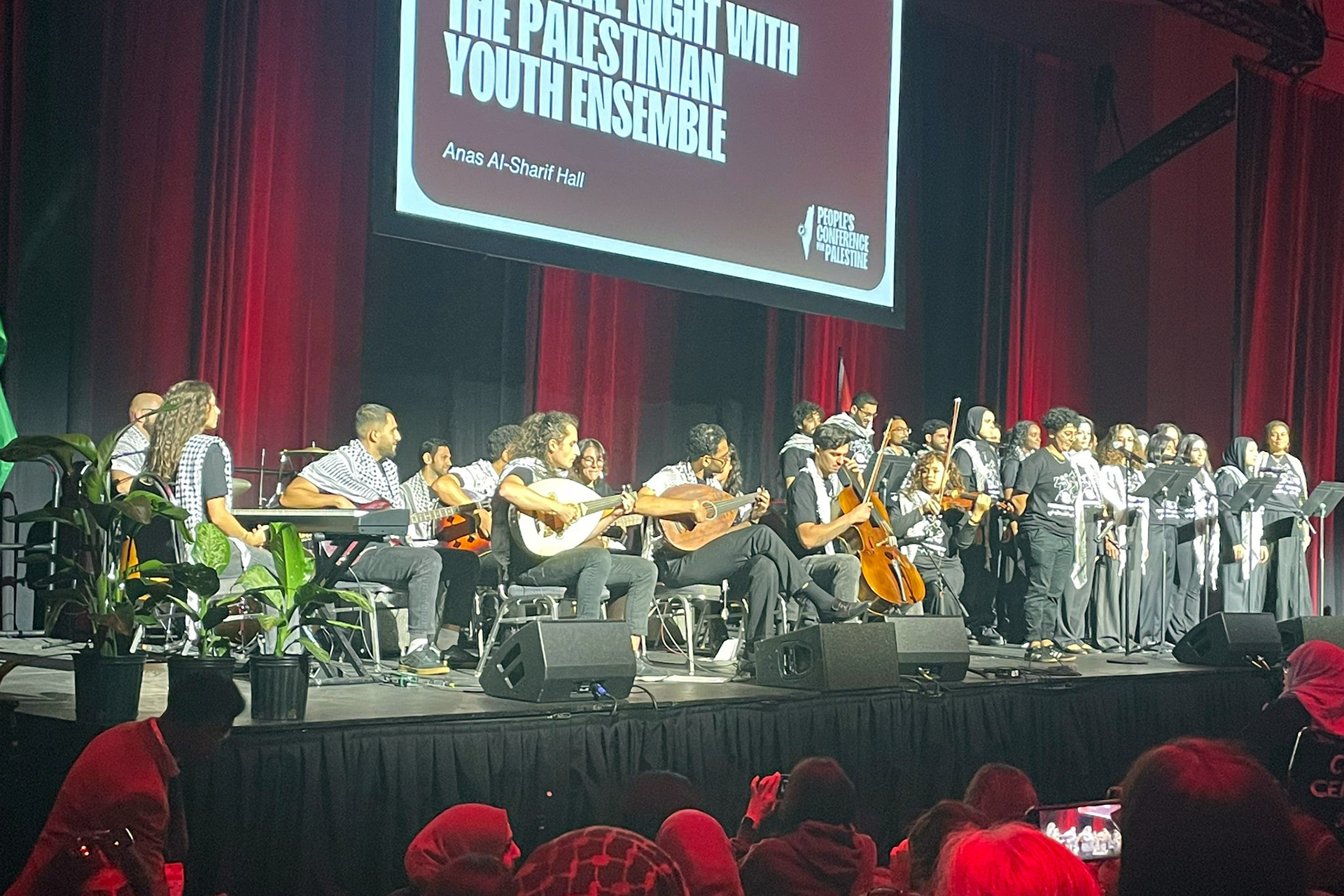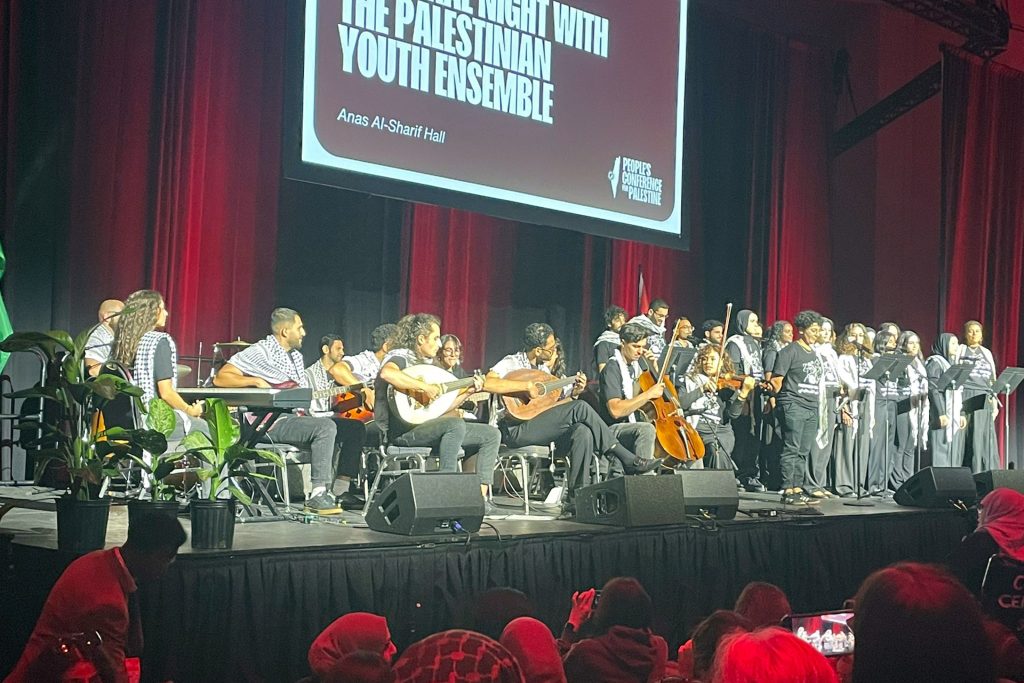Washington – Amid chants and Palestinian flags filling the hall, the second Popular Conference for Palestine concluded yesterday Sunday in Detroit, with over 4,000 participants gathering under the slogan “Gaza is the Compass.”
The three-day conference sessions included impactful political speeches, discussion workshops, and artistic performances blending music with tears and feelings of longing for the homeland.
Detroit was chosen for the second consecutive year to host the conference in recognition of the symbolic presence and activist heritage of its Arab community. After the first edition gathered about 3,500 participants last year, attendance this year exceeded 4,000 from various states, along with more than 90 speakers from inside and outside the United States.
Speakers agreed that the conference marks “the beginning of a new phase of struggle,” emphasizing that “liberation is achieved when the cost of occupation becomes greater than the cost of liberation,” urging Palestinians in the diaspora and supporters of the cause to make the occupation unsustainable through popular and institutional pressure.
Participants rejected attempts to “erase the Palestinian existence through US-backed genocide,” led by Israeli occupation leaders imposing harsh choices on Palestinians between displacement, starvation, or death under bombardment. They also pointed to the uprooting of thousands of olive trees, redrawing maps, and changing village names.
The second edition of the conference was supported by more than 300 organizations, featuring speakers from student, union, and human rights groups, notably US Congresswoman of Palestinian origin Rashida Tlaib, activist Linda Sarsour, academic Hatem Bazian, Palestinian surgeon Ghassan Abu Sitta, and youth voices like Mahmoud Khalil, who has become a symbol of the student movement in American universities.
Khalil emphasized in his Saturday speech that he “will not remain silent in the face of genocide,” considering his prosecution as evidence of the student movement’s strength and its threat to the Zionist narrative and Israeli propaganda.
He also affirmed that this generation of Palestinian and Arab youth in America challenges the system and exposes the truth of the occupation to the world, and that repression will not deter him from continuing the struggle.
In an emotional speech preceding the closing session, Congresswoman Rashida Tlaib welcomed the conference audience in her city Detroit, expressing pride in her Palestinian roots and being a daughter of “the blackest and most beautiful city” in America. She confirmed that Palestinians and their allies are growing stronger and more numerous, saying, “We are not going anywhere; we are just getting started.”
Tlaib linked the oppression of Palestinians in Gaza with internal repression in the United States against Black people and the poor, explaining that US policies destroying Gaza are directly connected to impoverishment policies within the US, clarifying, “A government that does not value Palestinian lives will not value American lives either.”
She criticized both the Democratic and Republican parties for their involvement in funding Israel but noted that “outside the crumbling empire halls in Washington, we are winning,” referring to the rise of popular protests in electoral districts and growing support to stop aid to Israel, likening the struggle against occupation to the fight that ended apartheid in South Africa.
The conference activities were not limited to political sessions and discussions; Palestinian culture and heritage were strongly present to highlight national identity. On the second evening, the hall—named after Al Jazeera journalist martyr Anas Al-Sharif—resounded with Palestinian dabke performances by two groups from Al-Bireh and Beit Jala in Palestine.
Harzallah, an organizer from the Palestinian community network in America, told Al Jazeera that these performances are more than artistic segments; traditional and national songs are the living archive of Palestinian resistance, carrying stories of land, exile, return, and steadfastness across generations, preserving Palestinian memory from extinction.
The organizers chose to honor several Gaza sector icons and martyrs by naming conference halls after them, including Gaza elder Khaled Nabhan, journalist Anas Al-Sharif, imprisoned doctor Hussam Abu Safiya, photojournalist Fatima Hassouna, young man Hassan Alaa Eyad, paramedic Rifaat Radwan, and Yousef Al-Zaq, the youngest freed prisoner in the world, born in occupation prisons and martyred in 2025.
At the conference conclusion, participants called on all free people worldwide to continue the struggle and not leave Palestinians alone facing the war and genocide machine.
They pointed to practical experiences that succeeded in breaking Israeli dominance, including in Spain where activists pushed the government to suspend arms shipments to Tel Aviv, as well as “Mask Off” campaigns that forced major logistics companies to stop supplying illegal settlements.
Speakers also called for confronting pro-Israel political lobbies, foremost among them “AIPAC,” described as the most dangerous arm in Washington for justifying occupation and facilitating arms deals. They stressed the need to organize pressure campaigns and hold accountable politicians who cover up war crimes or adopt Israeli propaganda rhetoric.
They launched calls for massive demonstrations in front of the United Nations headquarters in New York coinciding with Israeli Prime Minister Benjamin Netanyahu’s speech, who is wanted by the International Criminal Court for war crimes in Gaza, at the upcoming General Assembly meeting in September, to affirm rejection of his reception or granting any international legitimacy.














Recommended for you
Talib Al-Rifai Chronicles Kuwaiti Art Heritage in "Doukhi.. Tasaseem Al-Saba"
Exhibition City Completes About 80% of Preparations for the Damascus International Fair Launch
Unified Admission Applications Start Tuesday with 640 Students to be Accepted in Medicine
Egypt Post: We Have Over 10 Million Customers in Savings Accounts and Offer Daily, Monthly, and Annual Returns
His Highness Sheikh Isa bin Salman bin Hamad Al Khalifa Receives the United States Ambassador to the Kingdom of Bahrain
Al-Jaghbeer: The Industrial Sector Leads Economic Growth